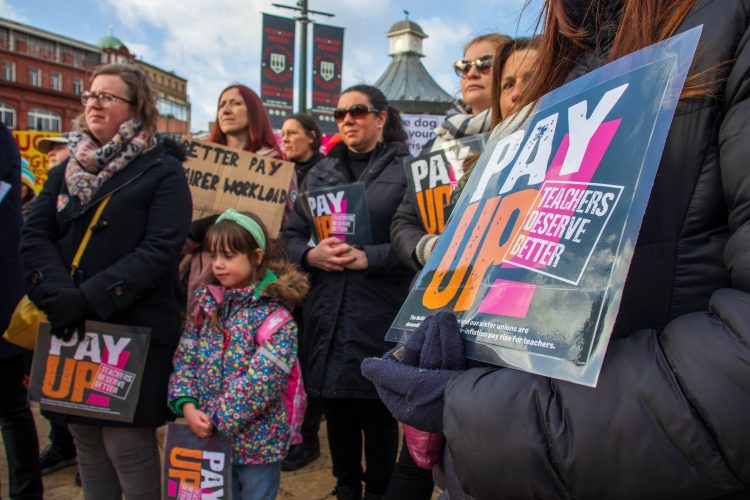Teaching is one of those professions that births all other professions, defined by a desire to help and nurture. To our biggest surprise, our teachers have shut their classroom doors and decided to strike against the government starting from the 1st of February.
The teachers in Bournemouth joined the national teacher strike dubbed ‘Walkout Wednesday’ to protest their working conditions. Teachers are striving for pay rise and better working conditions, leaving their classrooms and gathering publicly to get their voices heard.
The strikes continued during that month as nothing has been changed regarding their working conditions. The teachers have been offered a pay rise of 5 per cent by the department of education that should be funded by the school, but The NEU refuses to let schools have recourse to their budget to pay teachers more.

So, with more than 100,000 teachers participating in the national strikes, 85 per cent of the schools in the UK would be affected. Consequently, thousands and thousands of children across the country would be impacted, as well as their parents…
As journalists, we wanted to get a hold of the story, wondering what would cause members of such a noble profession to refuse to teach? Was it just about money?
We took our recording equipments and got inside the crowd, getting the chance to interview the protesters, as well as receiving their thoughts about the matter. But, what we’ve seen is beyond that. Those teachers were standing in the cold, waving placards because they care about their students. They don’t want children to be affected by the poor working conditions. They don’t want the school budget to be affected, otherwise, children wouldn’t be able to do indoor/outdoor activities. It wasn’t only about the money, but rather being driven by the love they have towards the profession, and the sense of duty and responsibility towards their students.
“It’s not just about teachers’ pay, the strikes represent much more than that,” said Thomas James Elms, a primary schoolteacher. “For me personally, it’s about the funding in schools. The government right now is asking schools to pay their staff out of school budgets. The big issue with this is that it’s coming right out of children’s education and from stuff like support staff, the chances of going on trips, SEN support, and support for children with special needs and abilities.”
“My discipline requires a lot of emotions,” said Lucyna Rossa, a lecturer at the Arts University Bournemouth. “My students needs lot of support and that’s all on my shoulders. I absolutely wanted to regulate my working hours. I like to spend my time and energy on teaching and research rather than administrative related work. A teacher is that person who can transforms a student’s life. So, appreciate and respect us.”
Parents had something to say about this, too. We wanted to get their point of view about this, which varied depending on their working conditions. Some parents were supporting the teachers, as they believe they are fighting for a good cause. Others were terribly upset about the situation, given the fact that they had to look for someone to look after the kids on strike days.

“I work full time remotely and my husband is a business owner, so we were able to adjust, but that must’ve been difficult for parents who work from 8-5,” said Norie Shimizu, a parent.
“We are being affected in different ways,” said Josey Horell, a mother of three. “This will be my daughter’s second strike. I have had to work and I have had to find people to look after her for the day. I have got some nice friends who helped me out the last time. Luckily for my other two children, their school isn’t striking. However, being a mum of three, I am already doing so much.”
As students, most of us were bothered by this. It was frustrating to come to a 9am class just to realise that the lecturer wasn’t there. Also, aren’t we spending lots of money on education? The least thing that could be done was to give students a short notice. But we want what’s best for our lecturers, don’t we?
“I am about to finish my master’s in international tax law and like a punch below the belt, lecturers and teachers went on strike for days,” said Gbenga Ibitoye, a student. “Considering how much students pay, especially the international students who pay double, you do not need to be a genius to know that the investor can afford to pay whatever these staffs are asking for at this stage. And you start to understand the importance of their action, they are fighting for a just cause.”
“I want my teachers to be working. Without them, I can’t get on with my work,” said Georgia Guppy, another student. “It is quite challenging because I feel lost without their guidance. It’s not nice to wander around campus with no direction.The reason for the strikes is also not my fault but I have to suffer for it.”
The strikes have indeed created a lasting impact. We have covered their stories, giving them a voice. And now we have gotten a window seat to see the stories behind the lives of those at the fore front of taking a stand to create the change they deserve. Though emotions high, we see renewed hope for change through these unique experiences
There are motifs of sadness, but also compassion, fairness and kindness restored, for teachers, and all stakeholders involved. Teachers are not people standing in the way of education, but also everyday people who need to be supported, to stay motivated, and meet the needs of the students they are teaching. It is actually a fight for the future of education.
“I was surprised at the level of support that students gave their lecturers,” said Jack Webb, our editor for this edition.
The human stories that you see in this edition, well, those are the stories we heard from the picket line.







